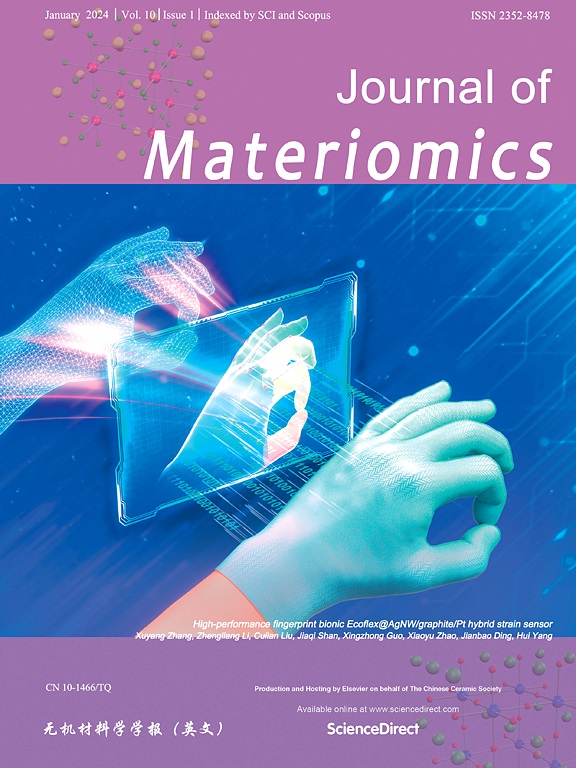Defect engineering induced phase competition in BNT-based relaxor ferroelectrics for dielectric energy storage
IF 9.6
1区 材料科学
Q1 CHEMISTRY, PHYSICAL
引用次数: 0
Abstract
Dielectric capacitors are independent in advanced electronics and pulse power systems as an energy storage and conversion medium. However, achieving high energy density at a low electric field remains challenging for dielectric materials to improve the safety of integrated electronic devices. In this work, the strategy of defect engineering-induced phase competition is proposed to improve the polarization behavior and strengthen dielectric temperature stability of (Bi,Na)TiO3 (BNT)-based relaxor ferroelectric, i.e., Na0.325Sr0.245Ba0.105–1.5x□0.5xBi0.325+xTiO3 (NSB0.105–1.5x□0.5xB0.325+xT) ceramics by changing the ratio of Bi3+/Ba2+. A high recoverable energy density (Wrec = 3.6 J/cm3) is achieved at a relatively low electric field of 160 kV/cm for x = 0.06 composition together with a high dielectric constant of 3142% ± 15% in a wide temperature range of 30–386 °C, which exceeds other lead-free dielectric ceramics at the same electric field. The results demonstrate that NSB0.015□0.03B0.385T ceramics are desirable for advanced pulsed power capacitors and will push the development of defect-tuned functionality of dielectric ceramics for energy storage applications.


电介质储能用bnt弛豫铁电材料的缺陷工程诱导相竞争
介质电容器作为一种能量存储和转换介质,在先进的电子和脉冲电源系统中是独立的。然而,如何在低电场条件下实现高能量密度,仍然是电介质材料提高集成电子器件安全性的挑战。本文提出了缺陷工程诱导相竞争的策略,通过改变Bi3+/Ba2+的比例,改善(Bi,Na)TiO3 (BNT)基弛豫铁电陶瓷(Na0.325Sr0.245Ba0.105-1.5x□0.5xBi0.325+xTiO3 (NSB0.105-1.5x□0.5xB0.325+xT)的极化行为和增强介电温度稳定性。在相对较低的电场(160 kV/cm)条件下,x=0.06的成分在30-386℃的宽温度范围内获得了较高的可回收能量密度(Wrec=3.6 J/cm3)和介电常数(3142±15%),超过了在相同电场下的其他无铅介电陶瓷。结果表明,NSB0.015□0.03B0.385T陶瓷是先进脉冲功率电容器的理想选择,并将推动介质陶瓷在储能应用中的缺陷调谐功能的发展。
本文章由计算机程序翻译,如有差异,请以英文原文为准。
求助全文
约1分钟内获得全文
求助全文
来源期刊

Journal of Materiomics
Materials Science-Metals and Alloys
CiteScore
14.30
自引率
6.40%
发文量
331
审稿时长
37 days
期刊介绍:
The Journal of Materiomics is a peer-reviewed open-access journal that aims to serve as a forum for the continuous dissemination of research within the field of materials science. It particularly emphasizes systematic studies on the relationships between composition, processing, structure, property, and performance of advanced materials. The journal is supported by the Chinese Ceramic Society and is indexed in SCIE and Scopus. It is commonly referred to as J Materiomics.
 求助内容:
求助内容: 应助结果提醒方式:
应助结果提醒方式:


